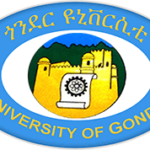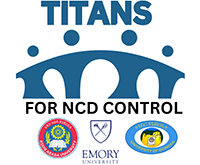
TITANS Program Overview
The Training on ImplemenTAtioN and team Science for NCD Control (TITANS) program will strengthen the capacity within and between Addis Ababa University and University of Gondar to conduct multidisciplinary implementation research to address NCDs.
TITANS will bring together teams of researchers from nursing, medicine, and public health to design, implement, and evaluate interventions to address NCD prevention and management. The program will provide extensive mentorship for participants in both implementation research and team science. The program goal is to promote multi-disciplinary, team-based, implementation research that reduces NCD burden in Ethiopia.
Program Leadership
The TITANS program has assembled a world-class, diverse, and interdisciplinary Executive Committee and program faculty.
Our program faculty consists of subject matter and methodological experts with backgrounds in medicine, nursing, basic sciences, epidemiology, qualitative methods, behavioral sciences, and management. Faculty will participate in the program in three different capacities: mentors, collaborating sponsors, and teaching faculty.
Fekadu Aga
Fekadu Aga is the current Dean and an Associate Professor of Nursing at the School of Nursing and Midwifery, Addis Ababa University. His research work focuses on improving self-care behaviors and outcomes for persons with type 2 diabetes and comorbid chronic conditions.
Biniyam Tilahun
Professor Binyam Tilahun (PhD) is a Professor of Digital Health and Implementation Sciences at the University of Gondar. He is the founder and Director of the Center for Digital Health and Implementation Sciences at the same university. He has more than 15 years of research experience in Digital health, Data Science, and Implementation sciences over three continents. He is also working as an advisor to the Ministry of Health of Ethiopia under the Health Information Systems Technical Working Group.
Rebecca Gary
Rebecca Gary utilizes a biobehavioral approach to design interventions that examine the effects of various exercise strategies on the underlying mechanisms that contribute to worsening symptom severity, physical function, cognitive decline, and poor quality of life across chronic conditions including advanced cardiovascular disease, HIV and cancer.
Saria Hassan
Saria Hassan is an Assistant Professor at the Emory School of Medicine and Rollins School of Public Health. She is a physician and implementation scientist who focuses on addressing the needs of persons living with non-communicable diseases in the setting of climate-induced disasters globally.
Elizabeth Rhodes
Elizabeth Rhodes is an implementation scientist who works with community and clinical partners to co-design and evaluate interventions to improve maternal-child health and nutrition and prevent NCDs. Current projects focus on testing care models for promoting maternal cardiometabolic and mental health, scaling breastfeeding services, and optimizing produce prescription program delivery.
Leslie Johnson
Dr. Leslie Johnson is an implementation scientist with expertise in participatory health research approaches and applying qualitative methods to examine health system challenges. Her work focuses on the adaptation and evaluation of integrated chronic care models for people with physical and mental health co-morbidities and addresses gaps in postpartum care.
Amare Tariku
Dr. Amare Tariku (PhD) is an Associate Professor of Nutrition and Public Health at the University of Gondar, and an implementation research scientist at the Center for Digital Health and Implementation Sciences (CDHi). He has led projects on maternal and child health, nutrition, health systems, digital health, and implementation science research. He is providing technical support to the Ethiopia Ministry of Health, including as a member of the Neonatal and Child Health Research Advisory Council for the Ministry of Health, and a secretary for the national Scale-Up-Nutrition (SUN) academia network.
Abebe Gebremariam Gobezayehu
Dr. Gobezayehu, an assistant research professor at a nursing school and Emory’s Ethiopia country representative, directs management and technical strategies for various projects. He specializes in strengthening health systems, focusing on capacity building, Collaborative Quality Improvement, and community mobilization for maternal, newborn, and child health, and nutrition. His expertise lies in addressing implementation factors, processes, and outcomes, integrating innovative solutions into health systems while emphasizing interdisciplinary collaboration and community engagement. He earned his MD and Pediatrics Specialty from Addis Ababa University.
Kassahun Alemu
Professor Kassahun Alemu (PhD) is Professor of Public Health and Epidemiology at the University of Gondar. He is Director of the Grant Searching and Collaborative Administration at the same university. Previously, he was a Senior Research and Fellowship Advisor for the HaSET Maternal and Child Health Research Program. With expertise in epidemiology, implementation, and health systems research, he has led projects on cervical cancer screening, pneumonia treatment, immunizations, neonatal mortality, and digital health. He has also contributed to capacity building and postdoctoral training in Ethiopia. He has been providing technical support to the Ethiopia Ministry of Health.
Participating Institutions

Emory University, Atlanta, Georgia USA (https://www.sph.emory.edu) is recognized as one of the nation’s leading research universities. The Rollins School of Public Health (RSPH) at Emory University is ranked fifth among public health graduate schools by U.S. News & World Report (2020). Located in Atlanta, GA, the “Public Health Capital of the World,” RSPH is in close proximity to the headquarters of the U.S. Centers for Disease Control and Prevention (CDC) as well as numerous international, state and regional health agencies and non-governmental organizations.


Addis Ababa University (AAU), Addis Ababa, Ethiopia (http://www.aau.edu.et), was established in 1950 as the University College of Addis Ababa (UCAA) and is the oldest and the largest higher learning and research institution in Ethiopia. Since its inception, the University has been a leading center in teaching-learning, research and community service. AAU has 10 colleges, 4 institutes that run both teaching and research, and 6 research institutes, and strives to be responsive to the fast-changing national and international educational landscapes.
University of Gondar (UOG) is one of Ethiopia’s leading research universities, established in 1954 as a Public Health institution. Located in the historic town of Gondar, the university boasts more than 11 colleges and employs over 10,000 staff members. UoG is renowned for its international collaborations in academics and research, with more than 150 ongoing projects in partnership with global organizations. Among its 12 research centres, the Centre for Digital Health and Implementation Sciences (CDHi) (www.cdhi.uog.edu.et ) stands out as a centre of excellence. Established in 2017 through a collaboration between the Ministry of Health and the University of Gondar, the centre is currently involved in various externally funded projects, collaborating with national and international partners such as the Bill & Melinda Gates Foundation, US CDC, USAID, Africa CDC, WHO, DDCF, and the European Union, among others. CDHi also serves as the WHO Technical Support Centre (TSC) for embedded implementation science research, thanks to its successful execution of large collaborative research projects in immunization, primary healthcare, human resources for health, and data use over the past five years. The centre has significantly contributed to the health system through its operational, implementation science, and interventional research efforts.
Acknowledgments
The TITANS Program is a collaboration between Emory University, Addis Ababa University (AAU), and University of Gondar (UOG). The TITANS program is supported by grant #D43TW012459 from the Fogarty International Center of the US National Institutes of Health.
